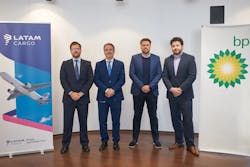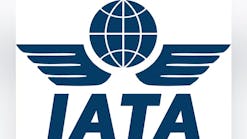Air BP Announces First Sale of ISCC EU Sustainable Aviation Fuel Produced at BP's Castellon Refinery
Air BP, the international aviation fuel products and service supplier, has announced the first sale of International Sustainability and Carbon Certification (ISCC) EU SAF from BP’s Castellon refinery in Spain. The flight was carried out by LATAM Cargo Chile from Zaragoza, Spain to North America. This latest announcement builds on its experience of supplying ISCC Plus SAF, first supplied in July 2021. Underlining the role of co-processing using existing refineries to meet SAF demand, this ISCC EU SAF is produced from sustainable feedstocks processed alongside fossil feedstocks.
“This latest announcement marks another important milestone for Air BP as we work towards making SAF more available. As a key step in replacing fossil fuel with renewable feedstock within existing refineries, co-processing has an integral role to play in scaling up SAF production in the most economical and efficient way. We believe that all technologies and pathways, and both standalone and co-processing are needed to help the industry decarbonize and reach its goal of net zero by 2050. The supply of ISCC EU SAF from Castellon will open new opportunities throughout the country and beyond,” said Andreea Moyes, Air BP’s global sustainability director.
“We are proud to collaborate with Air BP as its first customer to refuel with ISCC EU SAF from the Castellon refinery. This flight represents one of our most concrete steps in our SAF fuel agenda. As a group, LATAM is committed to contributing to the protection and care of the environment, so this first fueling reflects the importance of the collaboration of all players in the logistics chain including AENA and Exolum," said Andrés Bianchi, CEO of LATAM Cargo.
The ISCC EU SAF supplied by Air BP is made from waste based sustainable feedstock which is procured by the Castellon refinery and co-processed together with fossil fuel. Currently co-processing of sustainable feedstock at up to 5% is permitted within the jet fuel specification and BP has launched an industry taskforce looking to increase this to 30%. This sustainable component has an attributed saving of around 80% carbon emissions over its lifecycle compared with the conventional jet fuel it replaces.
BP aims to increase SAF production further in future and this week announced that as part of the Hydrogen Cluster of the Valencia Region (HyVal), its production of biofuels, including SAF, is expected to increase three-fold, to 650,000 tonnes a year 2030 in Castellón. Green hydrogen will be used as a feedstock for the production of SAF in an independent unit.
Air BP has been enabling ground-breaking test flights and investing in sustainable alternatives since 2008. To date, the business has supplied SAF to over 30 locations.


